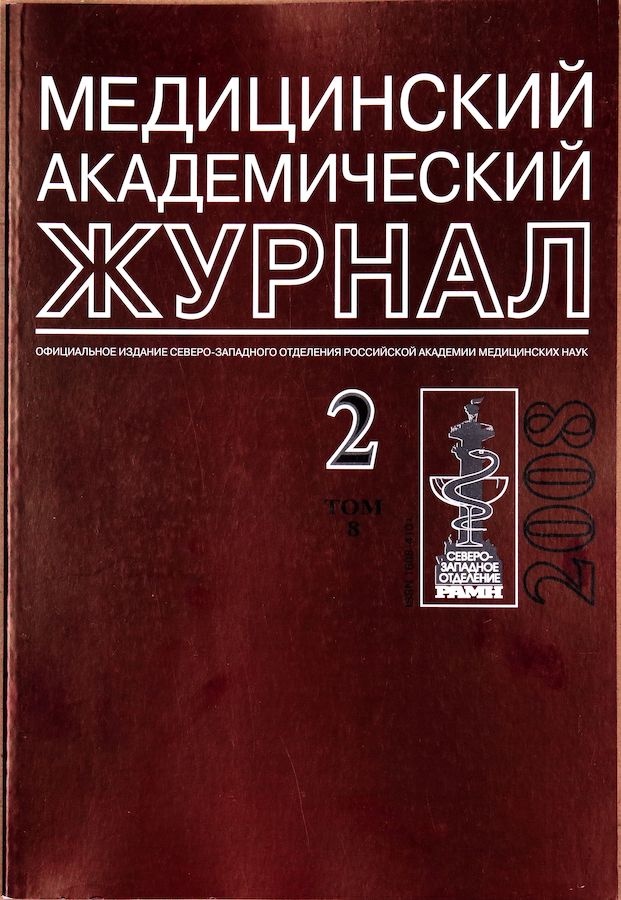Dynamic changes of pulmonary pressure and flow following pressor vasoactive drugs intravenous injection
- Authors: Tkachenko B.I.1, Evlakhov V.I.1, Poyassov I.Z.1
-
Affiliations:
- Institute of Experimental Medicine of the RAMS
- Issue: Vol 8, No 2 (2008)
- Pages: 14-20
- Section: Basis medicine
- Published: 27.08.2008
- URL: https://journals.eco-vector.com/MAJ/article/view/693659
- ID: 693659
Cite item
Abstract
In acute experiments on the mongrel anesthetized cats it was shown that following intravenous injection of catecholamines pulmonary flow always increases, meanwhile pulmonary pressure (in the most of the experiments) can be increased or decreased. After epinephrine injection the values of pulmonary pressure were varied comparing with the pulmonary flow equal increases. Norepinephrine caused the different changes both of the pulmonary pressure and flow. Angiotensin intravenous injection evoked various (elevating or lowering) changes of the pulmonary flow. In these conditions the pulmonary pressure can be increased or decreased independently from the direction of the pulmonary flow shifts. Following intravenous injection of these pressor vasoactive drugs pulmonary pressure reaches its maximal levels and returns to the initial values earlier, than pulmonary flow does. Thus we concluded that in the case of intravenous injection of pressor vasoactive drugs linear correlation is not revealed between the direction of the shifts of the pulmonary pressure and flow, their values and the time of the maximal level and duration of their changes.
About the authors
B. I. Tkachenko
Institute of Experimental Medicine of the RAMS
Author for correspondence.
Email: shabanov@mail.rcom.ru
Академик РАМН
Russian Federation, St. PetersburgV. I. Evlakhov
Institute of Experimental Medicine of the RAMS
Email: shabanov@mail.rcom.ru
Russian Federation, St. Petersburg
I. Z. Poyassov
Institute of Experimental Medicine of the RAMS
Email: shabanov@mail.rcom.ru
Russian Federation, St. Petersburg
References
- Гриппи М. Патофизиология легких: Пер. с англ. М.: Бином, 1997. 306 с.
- Дворецкий Д.П., Ткаченко Б.И. Гемодинамика в легких. М.: Медицина, 1987.
- Машковский М.Д. Лекарственные средства: Пособие по фармакотерапии для врачей. В 2 т. Т. 1. М.: Медицина, 1994. 357 с.
- Руководство по клинической физиологии дыхания / Под ред. Л.Л. Шика, Н.Н. Канаева. Л.: Медицина, 1980.376 c.
- Ругенюс Ю.Ю. Микрокатетеризация сердца через левую подключичную вену. Вильнюс: Минтис, 1975.200 с.
- Ayabakan C., Ozkutlu S. Normal patterns of flow in the superior caval, hepatic and pulmonary veins as measured using Doppler echocardiography during childhood // Cardiol. Young. 2003. Vol. 13. № 2. P. 143-151.
- Barnes P.J., Liu S.F. Regulation of pulinonary vascular tone // Pharmacol. Rev. 1999. Vol, 47. № 1. P. 87-131.
- Cheung P.Y., Barrington K.J. The effects of dopamine and epinephrine on hemodynamics and oxygen metabolism in hypoxic anesthetized piglets // Crit. Care. 2001. Vol. 5. № 3. Р. 158-166.
- Chimoskey J.E., Blacker P.C., Taquini A.C., Bohr D.F. Effects of angiotensin on pulmonary and systemic hemodynamics // Am. J. of Physiol. 1964. Vol. 202. № 4. Р. 690-694.
- Friedberg M.K., Feinstein J.A., Rosenthal D.N. A novel echocardiographic Doppler method for estimation of pulmonary arterial pressures // J. Am. Soc. Echocardiogr. 2006. Vol. 19. № 5. Р. 559–562.
- Hedenstiera G. Pulmonary perfusion during anesthesia and mechanical ventilation // Minerva Anestesiol. 2005. Vol. 71. № 4. Р. 319-324.
- Jaillard S., Houfflin-Debarge V., Riou Y. et al. Effects of catecholamines on the pulmonary circulation in the ovine fetus // Am. J. Physiol. (Regul. Integr. Comp. Physiol.) 2001. Vol. 281. № 2. P. R607- R614.
- Kaye A.D., Hoover J.M., Baber S.R. et al. Effects of norepinephrine on alpha-subtype receptors in the feline pulmonary vascular bed // Crit. Care Med. 2004. Vol. 32. № 11. Р. 2300-2303.
- Keith I.M. The role of the endogenous lung neuropeptides in regulation of the pulmonary circulation // Physiol. Res. 2000. Vol. 49. № 3. P. 519-537.
- Klöss T., Brückner U.B., Leinberger H. Pulmonary pressure-flow relation after trauma and hemorrhagic shock // Res. Exp. Med. (Berl.) 1986. Vol. 186. № 5. P. 325-336.
- Marshall R.P. The pulmonary renin-angiotensin system // Curr. Pharm. Des. 2003. Vol. 9. № 9. P. 715-722.
- Onuki T., Itaoka T., Kei J. et al. Correlation between slopes of pulmonary blood flow-driving pressure curve and routine pulmonary function // Nihon. Kyobu. Shikkan. Gakkai. Zasshi. 1990. Vol. 28. № 3. Р. 428-433.
- Pagnamenta A., Fesler P., Vandinivit A. et al. Pulmonary vascular effects of dobutamine in experimental pulmonary hypertension // Crit. Care Med. 2003. Vol. 31. № 4. Р. 1140-1146.
- Störk T.V., Müller R.M., Piske G.J. et al. Noninvasive determination of pulmonary artery wedge pressure: comparative analysis of pulsed Doppler echocardiography and right heart catheterization // Crit. Care Med. 1990. Vol. 18. № 10. Р. 1158-1163.
- Vizza C.D., Letizia C., Badagliacca R. et al. Plasma adrenomedullin and endothelin-1 concentration during low-dose dobutamine infusion: Relationship between pulmonary uptake and pulmonary vascular pressure /flow characteristics // Regul. Pept. 2006. Vol. 136. № 1-3. Р. 85-91.
- Witman A.C., Flrming J.W. The effect of epinephrine on the pulmonary circulation in man // Clin. Invest. 1951. Vol. 30. № 3. Р. 707-717.
Supplementary files






